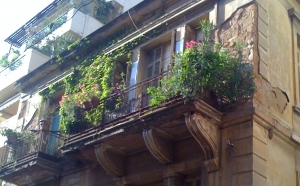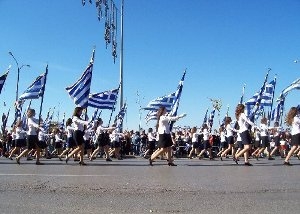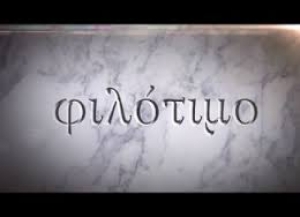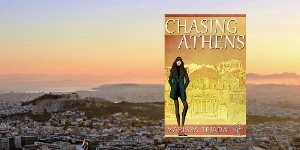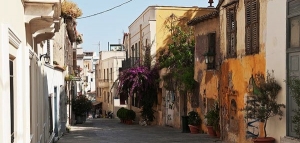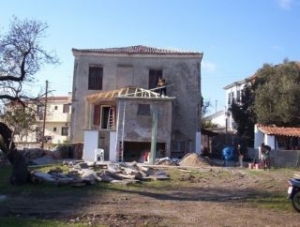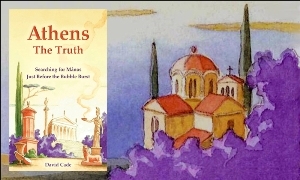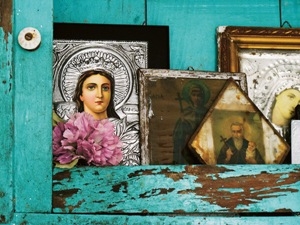ABOUT US
XpatAthens
Balcony Life In Athens
On the subject of washing, some people extend their washing machines onto it - others drag their living room furniture out there in the summer, turning it inwards to watch TV from the balcony... often Cd's can be found dangling off the (almost always) green awning that serves as both a cover from the sun and a cover from prying eyes (no "Friends" spying on you from their balcony across the way!), in order to reflect the sun and scare away the ever present pigeons.
Breakfast and dinner is often served out there - in fact, as mentioned: it is a real extension of the home. It helps if you've a big area and are not facing the main road, but even then it's great to utilise your balcony. Unless you live on the ground floor or in the basement, rarely does an Athenian home not have a balcony.
And if your even 'luckier,' like my friend, you can witness and hear everyday life going on around you - but maybe I draw the line at semi naked fat old Greek men in y-fronts, the Greek version of Ugly Naked Guy!
By Bex
lifebeyondbordersblog.com
Oct 28th is Ochi Day
On October 28th, expect to encounter parades and other celebrations commemorating Ochi Day, the anniversary of General Ioannis Metaxas' flat denial to the Italians' request for free passage to invade Greece. In October, 1940, Italy, backed by Hitler, wanted to occupy Greece; Metaxas simply responded "Ochi!" - "No!" in Greek. It was a "No!" that brought Greece into the war on the Allied side; for a time, Greece was Britain's only ally against Hitler.
Greece not only did not give Mussolini's forces free passage, they seized the offensive and drove them back through most of Albania.
Some historians credit the Greeks' fierce resistance to the later German paratrooper landings during the Battle of Crete with convincing Hitler that such attacks cost too many German lives. The from-the-air invasion of Crete was the last attempt by the Nazis to use this technique, and the extra resources required to subdue Greece drained and distracted the Third Reich from its efforts on other fronts.
Had Metaxas not said "No!", World War II might well have lasted considerably longer. One theory suggests that had Greece agreed to surrender without resistance, Hitler would have been able to invade Russia in spring, rather than making his disastrous attempt to take it in winter. Western nations, always happy to credit ancient Greece with the development of democracy, may owe modern Greece an equal but usually unrecognized debt for helping to preserve democracy against its enemies during World War II.
Was Metaxa really that succinct? Probably not - but that's the way the story has been passed down. He also probably responded in French.
On Ochi Day, all major cities offer a military parade, and many Greek Orthodox churches will be holding special services. Coastal towns may have naval parades or other celebrations on the waterfront.
By deTraci Regula
Short Film: The Greek Secret
Arianna Huffington, George Stephanopoulos, Bob Costas and Greek Orthodox Archbishop of America Demetrios are among the nationally-known Greek-Americans who appear in a video titled “The Greek Secret” produced by the Washington Oxi Day Foundation.
The video suggests that the secret to extraordinary Hellenic excellence — personal and as people — may spring from the uniquely Greek word philotimo.
The video features interviews with 29 leading Hellenes who each share their definition of a concept that only the Greek language has a word to describe: philotimo. Those interviewed defined philotimo as not only the “love of honor” but also as finding pleasure in sacrificing for: the good of others; doing the right thing; improving themselves and their families; and seeking to achieve respect and love from others.
“While it has not been released to the public until now, we gave a small number of Foundation supporters a sneak peek at this video over the weekend. It has already received over 10,000 views. Our prediction that this video can be transformational for our community and may help the Greek brand may be coming true,” said Oxi Day Foundation Founder and President Andrew Manatos.
To read more, please visit greekreporter.com
By Anastasios Papapostolou
The New Romantic Comedy Chasing Athens
Greece’s economic crisis, culture and landscape inspired award-winning journalist Marissa Tejada to set her first novel, Chasing Athens, in the Mediterranean country where she moved to several years ago. E-book romance publisher Musa Publishing released the romantic comedy as part of its Terpsichore contemporary romance imprint on April 25, 2014.
Set in Athens, Greece, the Greek Islands and Ithaca, New York, Chasing Athens follows Ava Martin, a heartbroken American expat, whose new husband unexpectedly ditches her after their move abroad. Instead of returning to the States, she makes an abrupt decision to stay. Despite pressure from her mother, uncertainty over her divorce, and issues with her long-estranged father, she’s determined to make it on her own. With her Greek friends, she laughs and learns while facing culture shock, language barriers and the charm of Mediterranean men, until a life-threatening emergency back home in sleepy Ithaca, N.Y., forces her to confront her disappointing past, and forces her to redefine the meaning of home.
“The heroine, Ava, gets thrown into Athenian reality including protests and violent riots. She also gets a taste of the alluring islands and vibrant nightlife. I want readers to feel what it’s like to live in a tumultuous, culture-rich, ancient yet modern city like Athens,” said Tejada. “Like many stories about women’s experiences abroad, place takes on a major role. Greece is a strong character in itself. Expat life inspired me and changed my life.”
Chasing Athens sells for $4.99 on the Musa Publishing Web site. It can also be purchased and downloaded from Amazon, Barnes and Noble, Smashwords, all Apple devices and from any vendor that sells e-books.
About Marissa Tejada
Tejada is also an award-winning journalist who has worked across the United States as a television reporter and anchor in Florida, Washington State and Upstate New York. She has also worked in newsrooms in Los Angeles and London and managed high tech PR in San Francisco. Tejada graduated cum laude from the Roy H. Park School of Communications at Ithaca College.
Currently, Tejada is a full-time freelance writer specializing in food and wine, technology and travel writing. She enjoys blogging for her travel photography blog, my Greece, my travels (www.mygreecetravels.wordpress.com). She currently lives in Athens, Greece.
You can join her on Facebook, follow her on Twitter, Google +, Pinterest, or visit her website at www.chasingathens.com.
CHASING ATHENS
Musa Publishing
Release date: April, 25, 2014
E-book ISBN: 978-1-61937-768-4
Price E-Book: $4.99
English vs Greek Christmas Traditions
English Tradition: Complain about going to see the parents
Greek Tradition: Of course we'll be with the parents. But, what's the big deal, we see them every week anyway
English Tradition: Arrive hungover, eat until upright, and then pickle oneself horizontal again.
Greek Tradition: Arrive hungry, pick at everything while it's cooking, complain you're too full to eat, eat anyway, and then fall asleep in front of the telly
English Tradition: Watch the Queen's speech
Greek Tradition: Complain about the pointlessness of the monarchy
English Tradition: Open presents before lunch
Greek Tradition: Open presents whenever curiosity gets the better of you, or just don't give them until New Year
English Tradition: Pork, pork, and more pork - glazed gammon, pork stuffing, bacon on the turkey
Greek Tradition: Chicken liver stuffing
English Tradition: Avoid an argument by getting drunk so you can pretend you don't remember it
Greek Tradition: Embrace the argument, add bells, whistles, and volume, then pack it away neatly for next year
English Tradition: Board games around an open fire
Greek Tradition: Boredom around a heap of foodstuffs
English Tradition: Pretending to hate Christmas so as to appear cool
Greek Tradition: Actually hating Christmas but pretending to enjoy it "for the children". Even when they're in their forties
Enjoy the holidays, everyone!
How The Athens Suburbs Got Their Names
Zografou: The municipality of Zografou is one of the best known areas of Athens and owes its name to Ioannis Zografos, a man who used to own a large land outside the center of Athens in the early 20th century and sold it in small plots to 100 families, who then formed the Zografou community (back at the time they used to say that someone lived on the Zografou estate). Later on, one of Zografos’ sons, Sotiris, became the first mayor of the municipality.
Psyri: The gentrified neighborhood of Athens was named after an islander from the island of Psara (which was called in the Middle Ages Psyra) arrived in the area and built a church to honor St. Athanasios. The man was called by the locals Psyris (meaning Psarianos, someone from Psara) and in turn the area was renamed into “Psyri” and not “Psirri” (with a double r) as commonly mistaken today.
Kolonaki: The prestigious neighborhood of Kolonaki got its name from a small column set in the central square of the area by the people of Athens during the Ottoman rule in order to pray to God to help them survive the plagues and illnesses of the time. The small column has a diameter of 30 cm and height of 2 m.
By Stella Tsolakidou
Christmas Shopping Hours In Athens
Christmas may the 'most wonderful time of the year' however sometimes it tends to be one of the most stressful times of the year, too. There's a lot to do and usually there isn't enough time to get everything done!
To make holiday shopping easier, the shops in Athens have extended their opening hours and include 3 days of Sunday shopping. This special schedule, designed to cater to the increased demand during Christmas and New Year, will commence on Thursday, December 12, 2024, and remain in effect until the end of the year.
Details of the 2024 Festive Schedule
From December 12 onwards, retail stores will operate with extended hours to ensure shoppers have plenty of time to prepare for the holidays. Here’s the complete schedule:
- Thursday, December 12: 09:00 – 21:00
- Friday, December 13: 09:00 – 21:00
- Saturday, December 14: 09:00 – 21:00
- Sunday, December 15: 11:00 – 18:00
- Monday, December 16 – Friday, December 20: 09:00 – 21:00
- Saturday, December 21: 09:00 – 21:00
- Sunday, December 22: 11:00 – 18:00
- Monday, December 23: 09:00 – 21:00
- Tuesday, December 24 (Christmas Eve): 09:00 – 21:00
- Friday, December 27 – Saturday, December 28: 09:00 – 21:00
- Sunday, December 29: 11:00 – 18:00
- Monday, December 30: 09:00 – 21:00
- Tuesday, December 31 (New Year’s Eve): 09:00 – 18:00
Holiday Closures:
Stores will remain closed on all of the following days:
Christmas Day - Wednesday, December 25
Boxing Day - Thursday, December 26
New Year Day - January 1
Also on - January 2nd!
Sunday Shopping:
Stores will be open on the following 3 Sundays during the festive season:
- December 15
- December 22
- December 29
A House In Greece
When my husband and I decided to take up a retirement project to renovate a large old house in Greece we were filled with excitement. That was ten years ago, and since then we have been travelling to our old house on the island of Lemnos in the Aegean for six months every year. But it has not been all blue skies and tavernas.
It was a project that would take its toll in various ways, emotionally, physically and financially over the years. We’ve watched the exchange rates, carefully noting when they went up or down. And then, when economic uncertainties hit Greece and the worldwide financial crash hit, we wondered how long we could afford to keep flying to Greece and paying for the renovations. There is no doubt that Ogden Nash got it right when he wrote that ‘It takes a heap o’ livin’ in a house t’ make it home. It takes a heap o’ payin’ too’.
While the dream of a house on an Aegean island, with sunshine, warm seas and rural peace, is something many busy, driven, city folk long for, it’s not easily achieved. Land in Greece always belongs to someone. Even if you spot a ruined house on an empty block you’ll very soon find it belongs to absent landlords who are planning to return sometime soon.
It was Takis’ perseverance over a very long period that enabled us to buy the house. We spent two years exploring our options and then six more years (while renovating) before we managed to fully own his great-grandfather’s house. And then it took even longer to renovate. However, all this time the house has continued to be a magnet for us and has made the effort worthwhile.
It’s been not only a big adventure, it’s been a love story - one with a house at its centre. On Lemnos we’ve lived and laughed, cried and sweated a most marvellous romantic dream-house adventure. Have we allowed the house to become our master? This wouldn’t be surprising, for as Emerson says, ‘A man builds a fine house; and now he has a master, and a task for life; he is to furnish, watch, show it, and keep it in repair, the rest of his days’. And dealing with the needs of our house we’ve found, with so many others, this kind of old house renovation project is addictive.
However, it’s not a simple thing to uproot oneself each year and take on a project such as this on the other side of the world. Travel does not get easier, mice still find holes to enter an old house, and in addition we’ve found that the house is big enough for many guests, sometimes too many! But, when I grumble about these difficulties, my friends are quick to remind me about the romance, ‘You’re on a Greek island, for God’s sake!’ they’ll say, throwing up their hands in frustration. ‘What have you got to complain about?’
I think what we’ve most enjoyed has been the fact that we have been thrown back onto our own resources. There are only a few shops nearby and it’s hard to get what you want when you want it. This is a challenge Takis enjoys, for not being able to go to a large Australian tradesman’s centre, he has to find ways of fixing things himself. As for me, I like working at a slower, more organic pace. One has time to notice the scent of lemon and nutmeg when baking a homemade cake, and to become more aware of garden scents when making bags of lavender seeds.
Of course, no one can have missed the fact that this decade has been a tumultuous one for Greece, with enormous immigration and fiscal problems. Has the economic drama affected us? Of course it has. We’ve always been aware there were problems with the way the Greek economy was run. But like many Greeks, up until the crisis hit the newsstands in 2008 we’d thought, ‘It’s just the way things are in Greece’. Now we’ve had to face the fact that, as sojourners with a property in Greece, everything we possessed in the country has lost at least half its value.
There’s a saying in Lemnos that one cries twice when coming to the island. This saying may have originated from the time when the island was a designated place of exile, and folk would cry when they landed on the island, going there reluctantly, but often they would cry again when they left, as by then they’d fallen in love with the island and its people. It’s a saying I’ve also adopted, for there have many been times when I’ve come to the island grudgingly, and many times when on leaving I’ve walked around my Greek garden very unwilling to depart.
But, after each questioning period, we’ll always decide that we’ll keep coming - at least for a few more years. For while riots and street marches occur in the capital cities, on the whole these troubles have not greatly affected our island. Here life appears to continue much as it did when we arrived. The town still doesn’t have municipal sewerage, the bells still wake us at seven on Sunday mornings, and while a few shops have closed on the Agora, others have opened.
The time will eventually come when we have to leave permanently and there will be so many things we’ll dearly miss, especially those sounds that are completely lost in a big city: the music of cockerels calling early each morning, the chatter of young children walking home from school, and even those street sellers who blare out descriptions of their wares as they drive past each day in summer.
By Dr Julia Catton
Athens - The Truth, By David Cade
Visitors to Greece have long been discouraged from spending more than just a day or two in the nation’s capital, but a new book by a New Zealand writer shows that Athens offers an extraordinary range of exceptional experiences. ‘Tourists are advised to see the Acropolis and a couple of museums but then to rush for a ferry and flee to the Greek islands!’ said author David Cade. ‘So they’ve no idea what they’re missing out on.’
Obsessed for decades by Greece’s unique music, Cade has plunged into Athens like a spring set free. The result, ‘Athens – The Truth’, is a 400-page revelation of aspects of the city unknown not only to tourists but even to many Greeks.
Graham Beattie, publishing guru and widely experienced judge of the Commonwealth Writers Prize, said: ‘I was immediately arrested by the 20-page introduction wherein he explains his fascination with all things Greek.’ Amazon readers have said that the book is ‘absolutely addictive’, ‘charming, critical, and thought-provoking’, and that it ‘makes the reader yearn for Athens’.
‘Athens – The Truth’ is a travel book that often reads more like a novel. As the author unearths the truths of the city, tension develops and the account moves towards a climax. At many points the writer’s love for Greece is obvious, but at other times his criticisms are frank. Whereas other authors appear to have been wary of treading on Greek toes, Cade tells all.
Here’s part of Cade’s description of a young Greek dancing in an Athens nightclub:
‘No longer dispirited, he rises, lifts a thigh, slaps it too, as if to show determination, and then, gazing upwards, his arms raised, he begins to glide, like an eagle dignified and free upon the winds, maintaining balance while invincibly swooping and swirling above all the challenges of life.’
‘Athens – The Truth’ has been written for anyone who has yet to encounter the true Greece. The author explained: ‘I wrote it not only to help tourists, students, or business people get the most out of Athens, but so that people at home, perhaps with no intention at all of ever actually visiting, can also encounter all those locations, people, and facts which even the most adventurous seem to miss.’
‘Athens - The Truth’ can be ordered online or from bookstores worldwide by requesting ISBN 9780955209031.
An e-book edition is available from Amazon for Kindles, iPads, iPhones, smartphones, and PCs. A second e-book edition has been made available for Nooks, Kobos, Apples, Sonys, and other devices.
Or you can get it from Public here: http://www.public.gr/product/books/english/diafora/athens-the-truth/prod5111007pp/ or from the Book Depository here:
http://www.bookdepository.co.uk/Athens-Truth-David-Cade/9780955209031
Athens - The Truth
Searching for Manos, Just Before the Bubble Burst
by David Cade
406 pages
Paperback Edition: ISBN 9780955209031
Kindle Edition: ISBN 9780955209048
Smashwords Edition: ISBN 9780955209055
Published by Tales of Orpheus
ABOUT THE AUTHOR
David Cade is a writer and actor based in the Shropshire Hills, England. He has worked in classical record production, schools, universities, and theatre. He studied Drama, Theatre Arts, and Music at the University of Birmingham and has an MA in Linguistics from the University of London. Besides the United Kingdom, he has lived in New Zealand, Fiji, Australia, and the Middle East. The music of Greece is his passion.
RELATED INFORMATION
Author’s website: http://www.davidcade.net
Twitter: https://twitter.com/AthensTheTruth
Facebook: https://www.facebook.com/AthensTheTruth
New Book: My Greek Island Home
In My Greek Island Home Claire Lloyd shares the story of how illness brought to an end her fast-paced London life as a very successful magazine art director, film maker, photographer and property developer, before finding renewed purpose in life when fell in love with the Greek island of Lesvos and the people who live there, and made it both her home and her passion.
Featuring evocative images of the beautiful island, the home which she and her partner have lovingly restored, and the many friends - and animals - who have welcomed them into their lives, My Greek Island Home is a celebration of a way of life that Claire and Matthew have embraced with open arms. They have now bought and restored a second home, Ken's Spiti, also featured in the book, which they offer for personally-tailored holidays to people wishing to experience and be part of 'the real Greece'.
My Greek Island Home by Claire Lloyd will be published by Clearview Books on 28th April.

